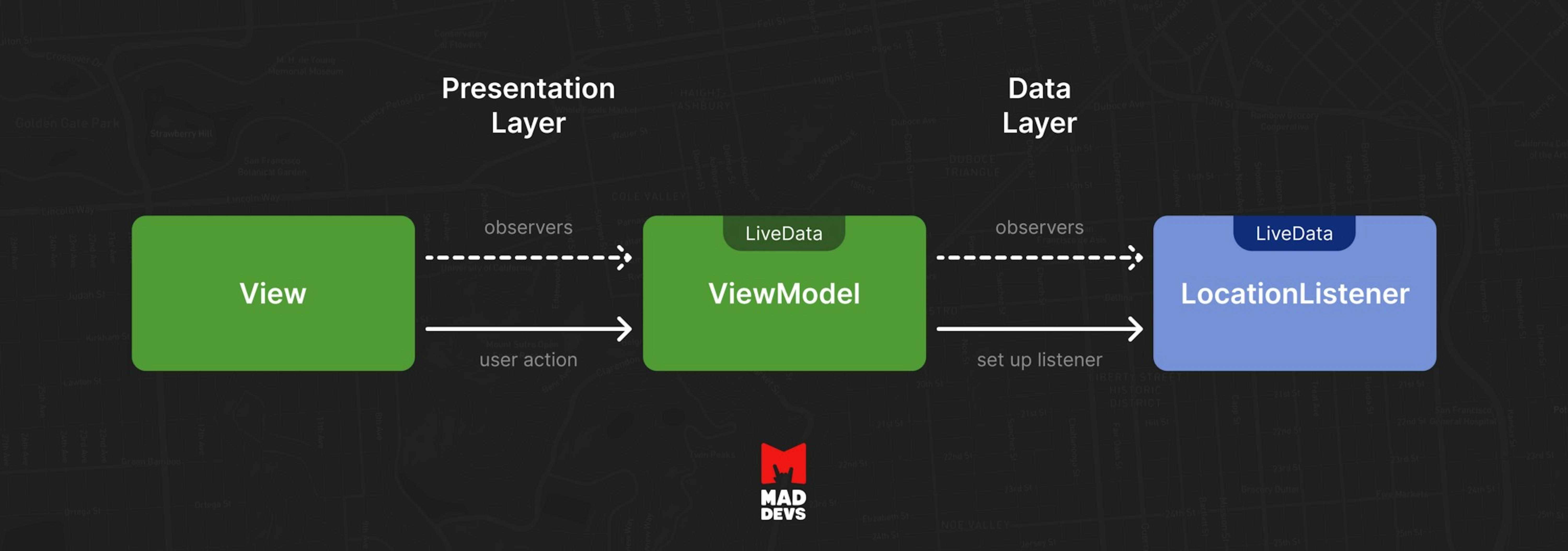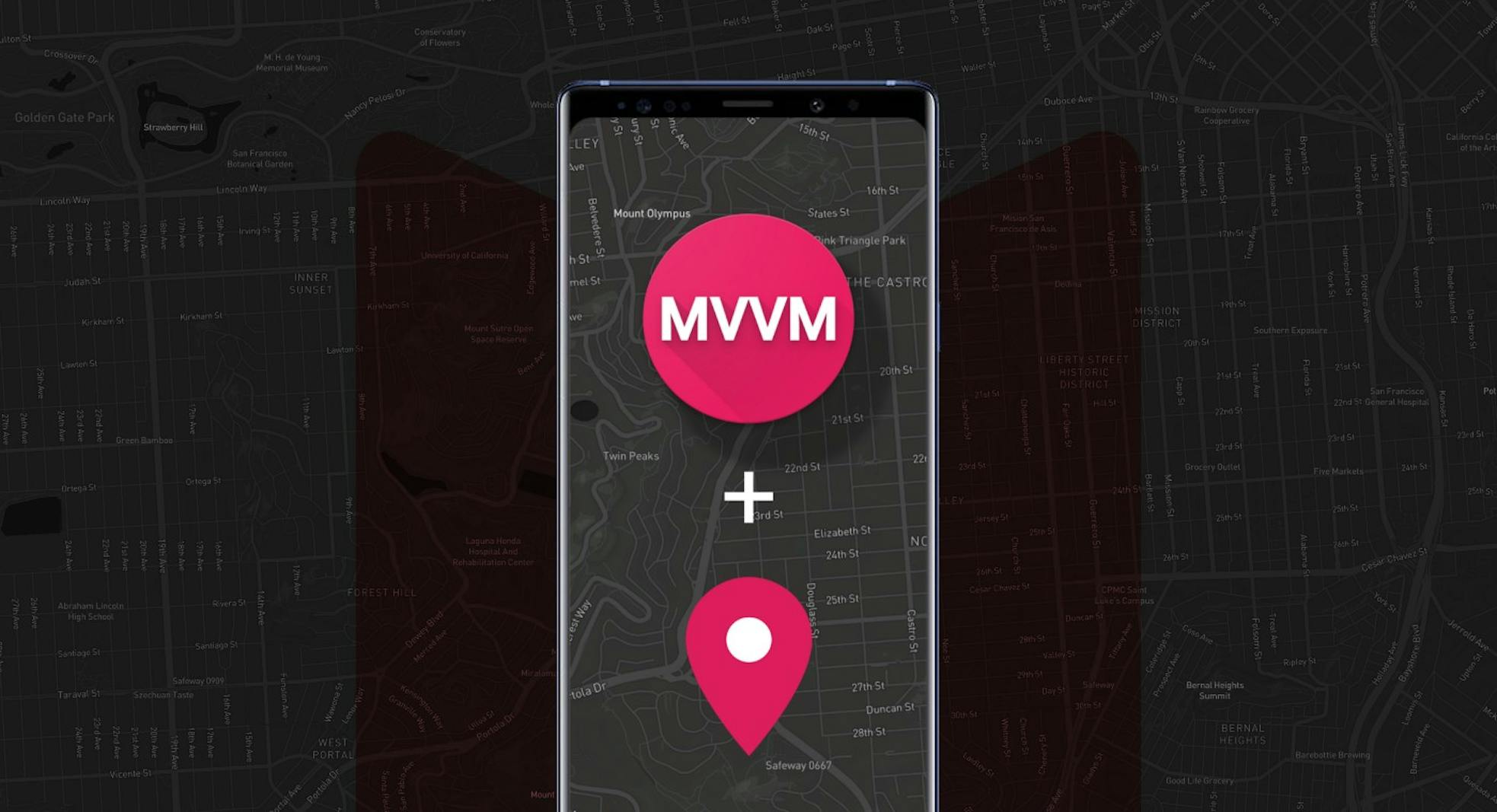Analyze with AI
Get AI-powered insights from this Mad Devs article:
I had a problem with implementing location detection logic without breaking Android application architecture.
After a couple of hours of researching, I finally came up with a solution to monitor the current location with LiveData usage. This article is a step by step solution to the above-stated problem.
Step 1. Add dependencies for location listener in Gradle module
implementation 'com.google.android.gms:play-services-location:x.x.x'
Step 2. Create Location Listener
class LocationListener private constructor(private val context: Context): LiveData<Location?>()
Inherit the class from LiveData
LiveData is an observable data holder class. Unlike a regular observable, LiveData is lifecycle-aware, meaning it respects the lifecycle of other app components, such as activities, fragments, or services. This awareness ensures LiveData only updates app component observers that are in an active lifecycle state.
Next is a full example of the Location Listener class:
class LocationListener private constructor(private val context: Context): LiveData<Location?>() {
var requestingLocationUpdates: Boolean = true
private var mFusedLocationClient: FusedLocationProviderClient? = null
private var mLocationRequest: LocationRequest? = null
@Synchronized
private fun createLocationRequest() {
Log.d(TAG, "Creating location request")
mLocationRequest = LocationRequest.create()
mLocationRequest?.interval = 20000
mLocationRequest?.fastestInterval = 5000
mLocationRequest?.priority = LocationRequest.PRIORITY_HIGH_ACCURACY
}
fun startService() {
onActive()
}
override fun onActive() {
super.onActive()
if (ActivityCompat.checkSelfPermission(
context, Manifest.permission.ACCESS_FINE_LOCATION
) != PackageManager.PERMISSION_GRANTED && ActivityCompat.checkSelfPermission(
context,
Manifest.permission.ACCESS_COARSE_LOCATION
) != PackageManager.PERMISSION_GRANTED
) {
return
}
fusedLocationProviderClient
createLocationRequest()
val looper = Looper.myLooper()
mFusedLocationClient?.requestLocationUpdates(mLocationRequest, mLocationCallback, looper)
}
override fun onInactive() {
if (mFusedLocationClient != null) {
mFusedLocationClient?.removeLocationUpdates(mLocationCallback)
}
}
val fusedLocationProviderClient: FusedLocationProviderClient?
get() {
if (mFusedLocationClient == null) {
mFusedLocationClient = LocationServices.getFusedLocationProviderClient(context)
}
return mFusedLocationClient
}
private val mLocationCallback: LocationCallback = object : LocationCallback() {
override fun onLocationResult(locationResult: LocationResult) {
val newLocation = locationResult.lastLocation
if (newLocation != null && requestingLocationUpdates){
value = newLocation
onInactive()
}
}
}
companion object {
private const val TAG = "LocationListener"
private var instance: LocationListener? = null
fun getInstance(appContext: Context): LocationListener? {
if (instance == null) {
instance = LocationListener(appContext)
}
return instance
}
}
}So what we did basically:
- build FusedLocationProviderClient
- build location callback
- build location request
- create looper
- request location updates
After we start requesting location updates this will tell the GoogleServices to let the app know whenever there’s a location change. In this example, I disabled location updating after it will found.
override fun onLocationResult(locationResult: LocationResult) {
val newLocation = locationResult.lastLocation
if (newLocation != null && requestingLocationUpdates){
value = newLocation
onInactive() //Disable location updating
}
}It is possible to use Location Listener in ViewModel to make it easier to use the result of location services.
The ViewModel class is designed to store and manage UI-related data in a lifecycle conscious way. The ViewModel class allows data to survive configuration changes such as screen rotations.
Example:
class LocationVM: ViewModel() {
var location: MutableLiveData<Location>? = MutableLiveData<Location>()
var locationRepository: LocationListener? = null
fun setLocationRepository(context: Context) {
locationRepository = LocationListener.getInstance(context)
}
fun enableLocationServices(){
locationRepository?.let {
it.startService()
}
}
}
Step 3. To make this works we should create observers
Observer for the listener:
viewModel.locationRepository?.let {
if (!it.hasObservers()) {
it.observe(this, Observer<Location?> { location ->
location?.let {
viewModel.location?.value = it
progress_bar.visibility = View.INVISIBLE
}
})
}
}Observer for mutable live data:
val locationObserver = Observer<Location> { location ->
// Update the TextView "location_text" text
Log.i("LiveData location", "" + location.latitude + " / " + location.longitude)
location?.let {
location_text.text = "" + it.latitude + "\n" + it.longitude
}
}
viewModel.location?.observe(this, locationObserver)And that’s it.

Check out an example project on GitHub.










